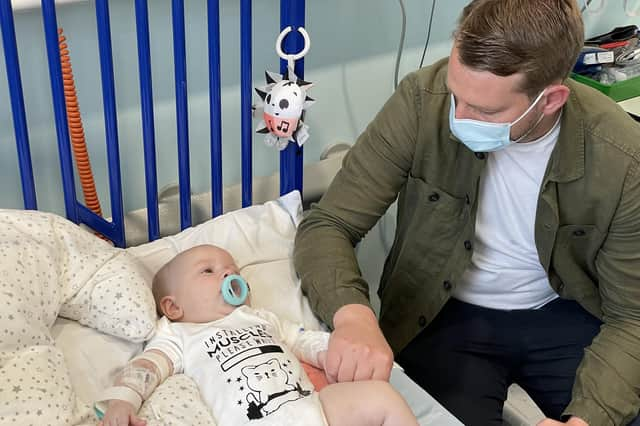What is SMA? Symptoms of spinal muscular atrophy explained - and what is new treatment Zolgensma


A five-month-old baby is the first person in the UK to be treated with a potentially life-saving drug for spinal muscular atrophy (SMA).
Arthur Morgan was diagnosed in May with the genetic condition, which makes muscles weaker and causes movement problems.
Advertisement
Hide AdAdvertisement
Hide AdThe baby received one-off gene therapy at Evelina London Children’s Hospital on May 25.
He was only diagnosed with SMA less than three weeks earlier.
Health Secretary, Matt Hancock, praised the new treatment, Zolgensma, a gene therapy which was administered on the NHS and has a list price of more than £1.7mn.
Hancock said: “I am so glad young Arthur can access this potentially life-changing treatment on the NHS.
Advertisement
Hide AdAdvertisement
Hide Ad“I hope it grants his family and many others renewed hope that more children’s lives can be transformed.”
What is SMA?
Spinal muscular atrophy is a serious genetic condition that gets worse over time.
Usually, the life-limiting condition is passed on if both parents are born with a faulty gene.
Although they may not have SMA themselves - they are known as carriers.
Advertisement
Hide AdAdvertisement
Hide AdAccording to the NHS, typical symptoms include floppy or weak arms and legs, shaking muscles, and swallowing and breathing difficulties.
The illness currently has no cure but medics are investigating new treatments.
Tests can also be done after birth to diagnose SMA in children and adults.
Until two years ago, there were no treatment options available for children with SMA, , which is the leading genetic cause of death in children.
Advertisement
Hide AdAdvertisement
Hide AdHowever, babies could potentially have the ability to sit, crawl and walk after being treated with the new treatment.
There are different types of SMA: type 1, type 2, type 3 and type 4.
Babies with type 1 rarely survived beyond the first few years of life, the NHS says.
In recent years, outcomes have improved with early diagnosis and treatment.
Advertisement
Hide AdAdvertisement
Hide AdMost children with type 2 survive into adulthood and can live long lives.
Whereas types 3 and 4 do not usually affect life expectancy.
Although the illness affects patients physically, there has been no evidence to suggest it has an impact on their cognitive function.
What is the new SMA treatment and where is it available?
The groundbreaking treatment that was administered to baby Arthur, is US gene therapy Zolgensma, which has been called the most expensive drug in the world.
Advertisement
Hide AdAdvertisement
Hide AdZolgensma, which has a list price of £1.79 million per dose, was made available on the NHS after the health service struck a deal with manufacturers Novartis Gene Therapies in March.
The drug contains a healthy copy of a missing or faulty gene called SMN1, the BBC reports.
The gene is then put inside a non harmful virus to make a replacement gene.
The virus is needed in the body to deliver the replacement gene into the nucleus of motor neuron cells.
Advertisement
Hide AdAdvertisement
Hide AdThen healthy cells start producing missing SMN protein - needed for muscle movement.
Five specialist NHS centres have so-far been commissioned across the country to administer the treatment, including Evelina London Children’s Hospital, where Arthur was treated.
They include Manchester University NHS Foundation Trust, Sheffield Children's NHS Foundation Trust and University Hospitals Bristol and Weston NHS Foundation Trust.
Arthur’s father Reece Morgan, 31, who works as a self-employed plasterer, said: “When we found out that Arthur would get the treatment, and be the first patient, I just broke down.
Advertisement
Hide AdAdvertisement
Hide Ad“It had been such a whirlwind few weeks, filled with lots of anxiety and adjustment, as we learnt about his condition and what it might mean for him and our family.
“We still don’t know what the future will hold, but this gives Arthur the best possible chance to give him the best possible future.”
Additonal reporting by PA.
